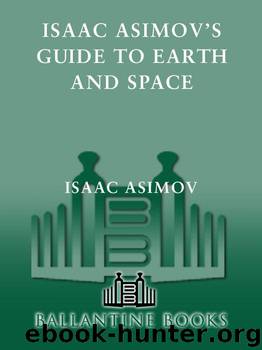Isaac Asimov's Guide to Earth and Space by Asimov Isaac

Author:Asimov, Isaac [Asimov, Isaac]
Language: eng
Format: epub, mobi
ISBN: 9780307792273
Publisher: Random House, Inc.
Published: 2011-04-26T23:00:00+00:00
55. ARE THERE PLANETS THE ANCIENTS DIDN’T KNOW?
The asteroids, which I have already described, may be tiny, but they are planets circling the sun, and no one knew of their existence before 1801. We might recast the question, then, and ask are there any large planets the ancients didn’t know?
Until the late 1700s, this was another question it would have seemed that no sensible person would ask. The seven “wandering stars,” the sun, the moon, Mercury, Venus, Mars, Jupiter, and Saturn, were all known to the ancient Sumerians by 3000 B.C. For the next 4,700 years no further objects had been seen to wander among the stars (with the exception of comets). How could there be any planets that were still undiscovered? Since all of the known planets were bright and unmistakable, surely any others would be the same and would have been easily found. So one could only conclude that none were there.
Yet the planets are not gleaming objects that give off their own light, as had been widely believed since the time of the Sumerians. First the moon, from its phases, was found to be a dark body by the ancient Greeks. Later the telescope revealed that Mercury and Venus exhibited phases, too, and were therefore dark bodies. Thus it was assumed that all of the planets were dark bodies that shone only by light reflected from the sun.
In that case, the farther a planet was from the sun and the smaller it was, the less sunlight it would receive, the less it would reflect, and the dimmer it would appear in the sky. If there were other planets beyond Saturn and they were considerably smaller than Saturn, they might be so faint that they’d probably be overlooked by astronomers who expected that all planets were bright. Besides, the farther a planet is from the sun, the more slowly it moves along its path, so that its wandering against the background of the stars might disguise it still further.
All this is perfectly clear in hindsight, but astronomers, even with their telescopes, had gotten so used to thinking that all planets were bright that it never occurred to them to look for a dim one, and, in fact, they disregarded the possibility.
When a new planet was finally discovered in 1781, it was found by accident. William Herschel (who first suggested the term asteroid) was a musician by profession, but became interested in astronomy as a hobby. He tried to buy a telescope, found that those he could afford weren’t much good, and constructed his own, which turned out to be better than any others then in existence. With this homemade telescope, he came across an object in the sky that looked like a small disk of light, the way planets did. It didn’t occur to him at first that it might be a planet, and he assumed it was a comet. But comets are fuzzy, and this disk had sharp edges, and the new object moved more slowly than
Download
Isaac Asimov's Guide to Earth and Space by Asimov Isaac.mobi
This site does not store any files on its server. We only index and link to content provided by other sites. Please contact the content providers to delete copyright contents if any and email us, we'll remove relevant links or contents immediately.
| Aeronautics & Astronautics | Astronomy |
| Astrophysics & Space Science | Comets, Meteors & Asteroids |
| Cosmology | Mars |
| Solar System | Star-Gazing |
| Telescopes | UFOs |
Tools of Titans by Timothy Ferriss(8363)
Turbulence by E. J. Noyes(8040)
Secrets of Antigravity Propulsion: Tesla, UFOs, and Classified Aerospace Technology by Ph.D. Paul A. Laviolette(5364)
Astrophysics for People in a Hurry by Neil DeGrasse Tyson(5182)
Room 212 by Kate Stewart(5105)
Design of Trajectory Optimization Approach for Space Maneuver Vehicle Skip Entry Problems by Runqi Chai & Al Savvaris & Antonios Tsourdos & Senchun Chai(5063)
Pale Blue Dot by Carl Sagan(4996)
The David Icke Guide to the Global Conspiracy (and how to end it) by David Icke(4701)
A Journey Through Divination and Astronomy by Publishing Pottermore(4379)
Goodbye Paradise(3798)
Apollo 8 by Jeffrey Kluger(3702)
COSMOS by Carl Sagan(3617)
The Five People You Meet in Heaven by Mitch Albom(3557)
Losing the Nobel Prize by Brian Keating(3534)
How to Read Water: Clues and Patterns from Puddles to the Sea (Natural Navigation) by Tristan Gooley(3460)
Brief Answers to the Big Questions by Stephen Hawking(3428)
How to Read Nature by Tristan Gooley(3333)
The Order of Time by Carlo Rovelli(3188)
A Brief History of Time by Stephen Hawking(3022)
